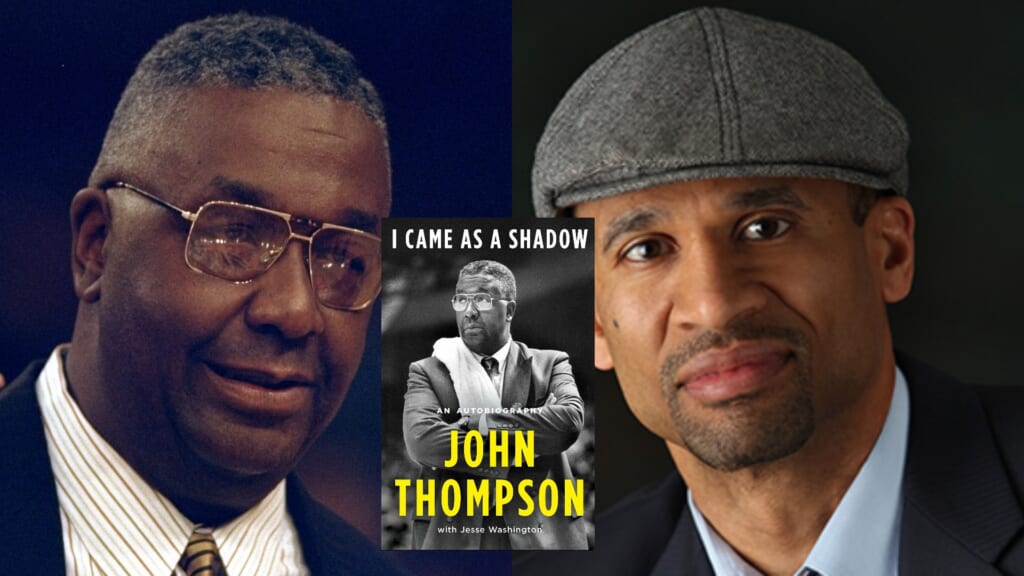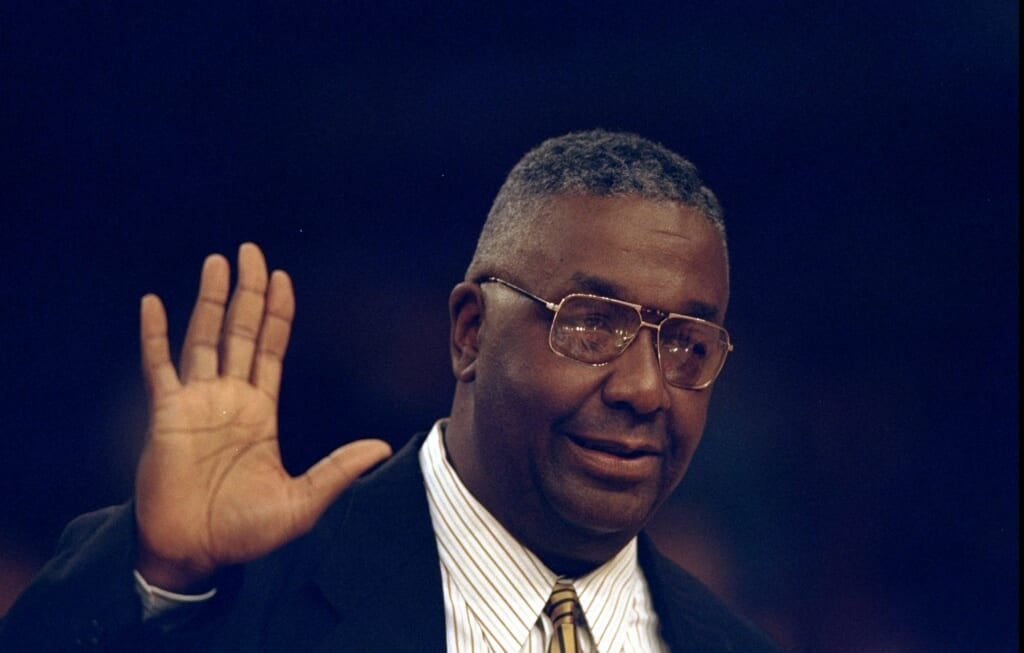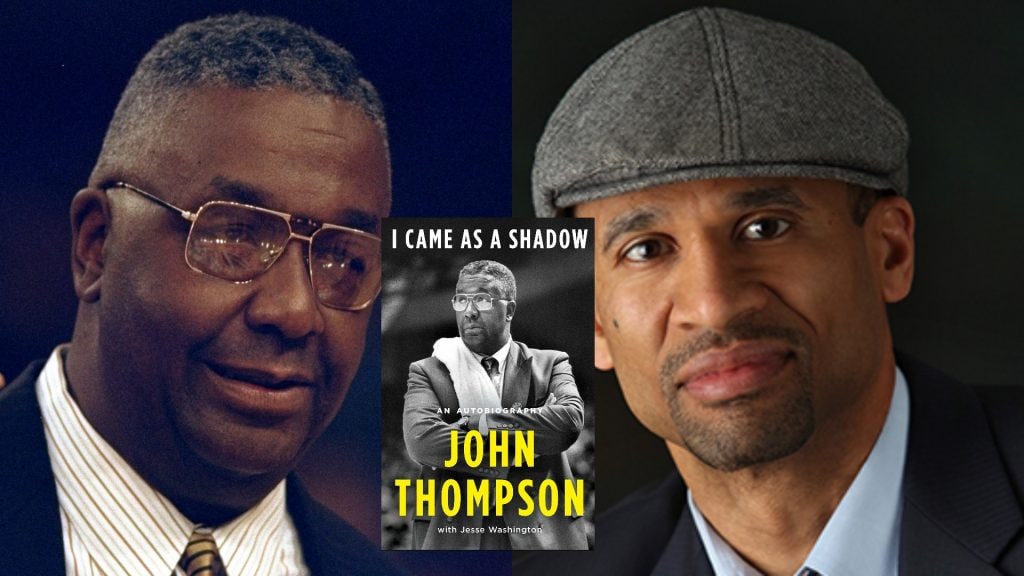Legendary coach John Thompson’s autobiography ‘I Came As A Shadow’ reveals more about his extraordinary life
Journalist Jesse Washington was tapped to work with the Georgetown Hoyas Hall of Fame coach on the book
After decades of silence, renowned Georgetown Hoyas basketball coach John Thompson decided to write his autobiography to show what went on behind the scenes of his extraordinary life. From becoming the first African American head coach to win an NCAA championship, which he did with the Hoyas in 1984, to directing the careers of NBA Hall of Fame centers like Patrick Ewing and Alonzo Mourning to taking a chance on a Virginia kid named Allen Iverson after he’d been in jail, no one has had a career quite like Coach Thompson.
Before his passing at the age of 78 last year, Thompson, who was inducted into both the Naismith Memorial Basketball Hall of Fame and the National Collegiate Basketball Hall of Fame, chose veteran journalist Jesse Washington to help him write his story. “I Came As A Shadow” is a book about so much more than basketball. Coach Thompson loved Black people, intellect, and character which was exemplified by his reputation as a coach whose lasting impact went well beyond the game. theGrio sat down recently with Washington to discuss the book and Thompson’s legacy.

theGrio: How did this project come about?
JW: Coach finally decided to write his memoir and define himself since so many people had defined him over the years. That, and his children convinced him this was the time to share his stories. I was the right guy at the right time and place. He didn’t know me and folks put my name in a pile to consider me. I went to his house for an interview to see if we were a fit and I survived. That’s how I got the gig. That, and Coach always liked an underdog, which was me.
What was it like first meeting Coach Thompson, such an iconic figure?
He engaged me with his intellect and penetrating questions. No small talk. He immediately got down to business. He said, ‘You’ve never written a book like this before and what makes you think you can write mine?’ – not in a mean way. He insisted off the bat that this wasn’t a book about basketball, it should be about all the other things that were important to him – education, uplifting Black people, breaking down barriers for all the disadvantaged people in society. That was exciting to me because that’s what my own work is about. Coach’s passion for all the things that are more important than the game itself is what interested me and excited me about this project.
Why do you think Coach Thompson resonated with people and especially Black people, so significantly?
Coach says in his book that the number one reason he resonated with people is because he won. He had so much he wanted to accomplish off the court, and he knew he had to win in order to be heard. Coach wanted to develop more than basketball skills in his players, it was about character and values. He was an educator and a teacher first and foremost.
And as a Black man, he dealt with so much racist abuse, but never compromised or changed who he was. He never changed how his teams played or how he viewed the world. And when people were scared of him for no reason because he was 6’10 he never wavered, quieted down, calmed down, he just kept achieving.

He represented so many important things to Black people in this country. In the 1980s Black people were really under attack in so many directions and Coach refused to back down. He stood up for his team and himself with intelligence and discipline and excellence, and these are the reasons why Black folks and many white people loved him.
What surprised you the most about Coach Thompson?
His influences and the people who gave him those values. It started with Black women. He credits his mother and father as the most influential people in his life, period. But at so many pivotal points in his life, and in some of the moments that made him famous, he traces back and talks about his mom. In 1982, Georgetown lost to North Carolina and Michael Jordan in the championship game. Georgetown’s point guard, Fred Brown, got confused, passed the ball to the opponent and cost them the championship.
Coach hugged Brown after he gave away the game. He embraced him, and it became one of the most famous moments of his career. When I asked him why he did that, he said, “I give my mother more credit for that hug than I give myself.” And he explains in the book the background of what his mother did for him throughout his life.
Another legendary moment is when he met with D.C. drug kingpin Rayful Edmond who was hanging out with his Georgetown players and he had to put a stop to it. This wasn’t some nickel and dime hustler, he was one of the most powerful criminals on the East Coast. Coach put the word out and Edmond came to visit him in his office. Why would Coach take that kind of risk? He says in his book, ‘When I was a little boy and something was going on in the street, my mom would take off her apron and come outside to see what was going on.’ That’s what he did with Rayful Edmond.
Two other women were incredible influences in Coach’s life. Sametta Wallace Jackson, his sixth-grade teacher, and the director of his master’s program, Dr. Anita Hughes. These two women had an enormous influence on him and Coach stated he got a lot of his coaching techniques from them and they didn’t even play basketball. Coach believed if it weren’t for these women he would have been lost. In the fifth grade, Coach couldn’t read and was expelled from his school. And that was when Ms. Wallace Jackson came into his life.
Those of us who follow basketball always knew Coach was deep but there is so much more depth to his story than any of us ever knew.
What do you hope readers will take away from this autobiography?
Coach wanted people, among other things, to value our intelligence. He wanted us to understand that intelligence is our most effective weapon against all of these forces that are still lined up against Black people. Coach wanted to encourage all of us to think our way to greatness.
Jesse Washington is a writer for ESPN’s The Undefeated. You can find him on Twitter at @jessewashington.
Have you subscribed to theGrio’s podcast “Dear Culture”? Download our newest episodes now!
TheGrio is now on Apple TV, Amazon Fire, and Roku. Download theGrio today!
The post Legendary coach John Thompson’s autobiography ‘I Came As A Shadow’ reveals more about his extraordinary life appeared first on TheGrio.

